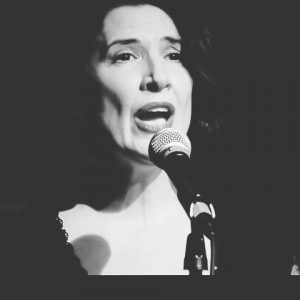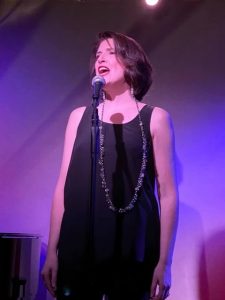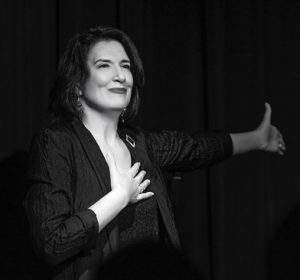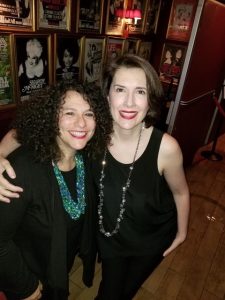Return Engagements: Singer Meg Flather Remains Stuck with a Thing Called Hope
(Third and final installment of a limited series on Return Engagements.)

On February 21, 2020, singer-songwriter Meg Flather performed her first-ever gig at Manhattan’s Beach Café. She was, at the time, about to put into gear another, more focused show—about Richard Rodgers and Oscar Hammerstein II. The Beach engagement was called A Cockeyed Optimist, after a song from Rodgers and Hammerstein’s score for the musical South Pacific.
During her performance, the two-time Bistro Award honoree had an epiphany: “I knew as I sang that it was the last time I was gonna sing [publicly] for a very long time.”
Flather’s husband had been tracking the COVID-19 path since before the beginning of the year. On New Year’s Eve, as she sat in front of the television screen watching 2020 being ushered in in Times Square, he called her over to his computer. “He showed me the map of China, and he showed me what was happening in Europe, and he turned to me and said, ‘It’s here. You know it’s here.’”
Nevertheless, after the Beach Café show, Flather moved ahead with her musical plans as best she could. On March 9 she had a rehearsal for an installment of Ricky Ritzel’s Broadway series at Don’t Tell Mama. She noticed how quiet things were in the bar area. The next day she met with director Lennie Watts and musical director Tracy Stark for the first rehearsal for the Rodgers & Hammerstein project, which was to focus on the socially progressive outlook of the famous songwriting team, viewed from a 21st century woman’s perspective. By now, however, the inevitability of the global health crisis had fully sunk in.
“Walking down Ninth Avenue, I just knew: It was time to go inside.”
Keeping the motor running
Flather was clearly more prepared than many people for the coming quarantines, lockdowns, and shelterings in place. She relied on her go-to strategy for dealing with trying situations: keeping busy. “This has always been the way I navigate anxiety,” she says.
She made plans to ride out the storm. Lots of plans. She gave herself task after task to help her keep from sinking into inertia and despondency.

To begin with, there was her day job. Flather is a brand ambassador for a science-based skincare product called StriVectin. Pre-pandemic, the position involved considerable travel around the country as well as appearances on the Home Shopping Network to market StriVectin on-air. But the job description changed as the global health situation worsened. She would still do many of the activities she had been doing—including appearing on HSN—but, like so many other people, she would tackle the work from home. She had to come to terms with what she calls “that Wilma Flintstone part of me that’s absolutely petrified of technology.”
“I kind of tucked the fear and anxiety away and just hunkered down and tried to get on the side of gratitude…” she says. “I had this luxury of being able to be inside.”
When she wasn’t touting the benefits of StriVectin, she turned to other tasks from her pre-pandemic agenda. She exercised—doing 30 minutes of Pilates daily, spending another 30 minutes walking laps up and down the hallway. And she exercised her voice, too. She began taking a weekly singing lesson online from a teacher she’d long hoped to work with (and who suddenly had slots open on the calendar). She practiced her vocal exercises daily.
Additionally, she continued her regular participation at Woody Regan and Ann McCormack’s Groovin’ on a Sunday Afternoon open mic event—now rechristened Groovin’ at Home on Sunday. And she signed up for classes at Lennie Watts’s Singnasium as well.
To top it all off, she managed during the pandemic to to write three new songs and to finish the recording of a new CD.
“I kept things going to keep those muscles exercising,” she says. Certainly, she missed getting together in person with other vocalists and musicians. Virtual activities definitely weren’t everything, but they were something. And, through it all, Flather remembered to bang pots and pans from her window every evening at 7 to help show support for healthcare personnel and other essential workers.
Please stay in touch

As the months trudged by, Flather kept connected with many of her peers by leading weekly group Zoom meetings for a network of more than two dozen women who had appeared with her in her 2019 MAC Award–winning show, Meg Flather Songs: A Cabaret Sisterhood. In preparation for that ambitious show, she had created a Facebook Messenger page to facilitate the complicated rehearsal schedule. It was singer Deborah Zecher who now suggested that the participants could interact through Zoom.
Nearly all members of the Sisterhood tuned in to the earliest online meetings, but as the weeks went by, these confabs became a pressure-free, drop-in-when-you-can way of gathering, in order to offer support and commiseration to one another. The meetings underscored for Flather just how much she’d been in need of contact with other people in the cabaret community: “They would lift me up just by being there—just by showing up.”
As the pandemic cooled down somewhat in New York, Flather took her walking regimen outside to a park along the Hudson. And she began to think about how she might begin performing for audiences again.
She now worked in earnest with Watts and Stark on the Rodgers & Hammerstein show—finalizing the setlist and creating patter. She never wound up participating in any of the outdoor venues that popped up in the fall of 2020. But in November, she participated in a filmed version of her Unexpected Trio show for Urban Stages (with Stark and Rosemary Loar) and found herself flummoxed when the camera started rolling. It was an old bugaboo of hers, materializing yet again. Despite her extensive work on camera as a brand ambassador, she had never been entirely comfortable singing while being filmed. “COVID really forced me to face a lot of my fears,” she says.
In early 2021, as the vaccinations arrived, she was able to perform a version of the Rodgers & Hammerstein show for students at Nicholas Adler and Corrina Sowers Adler‘s NiCori Studios in New Jersey, where she sang from behind a plastic screen. She would also try out selections from the show for friends and family online.
A turning point came with some appearances at the West Bank Café—not downstairs in the Laurie Beechman Theatre, but on the restaurant’s main level, near the front door. Flather began by making a cameo appearance in Gretchen Reinhagen’s show but was then enlisted to do her own set. This engagement was not as formal as a regular, ticketed cabaret show. She was hired to sing music to dine by. Patrons in the restaurant were not discouraged from talking with each other while singers performed. All of this was fairly new to Flather, who had seldom performed in piano bars or similar settings.
“It was packed, it was fun, it was emotional….” she says of her first full West Bank show. “Tracy and I had the luxury of getting together in a rehearsal studio and putting it together, really tweaking the order. We wanted to create an offering that wasn’t just throwing music out to eat to. I can’t help but try to create a show. So, it was kind of like a ‘since we last saw each other’ show: ‘Let me tell you what’s been going on in my life.’”
A second show was scheduled, but this time she was entertaining not just people on her mailing list but people she didn’t know—regular patrons of the restaurant. Fortunately, these customers were respectful and relatively attentive. If they talked among themselves, they did so quietly. “It was really good for me,” she says, “to be thrown out of the gate so quickly and to have to sing for strangers sitting at a bar.”

Delta Dawn
On Sunday, September 26 at 6pm, Flather is scheduled to perform her Rodgers & Hammerstein program in the Brick Room at Don’t Tell Mama, with Stark at the piano. But with the Delta variant rampaging across the continent and beyond, nothing is certain. Flather is philosophical about this. She knows the coast is far from clear. She’s more than willing, of course, to make adjustments for safety as necessary. (Under new regulations, audience members will need to provide proof of vaccination to be admitted to her show—and all shows at the venue.)
“We have to figure out how people are going to have a two-drink minimum wearing a mask. But I’m hoping I get to do the show for somebody…. I might do it for five people. I’ll be grateful if I get to do it for five people.”
She feels COVID has served to create a new sense of humility, equality, and fraternity among performers in NYC’s cabaret world—a sort of “we’re all in this together” camaraderie. “We’ve all been humbled—the stars of cabaret and the newcomers of cabaret.” She compares the situation to jury duty. “We’re all eating the same stale baloney sandwich in jury duty!”
Then, more seriously: “It’s really just about making the music, for whoever wants to hear it—and improving, however you can improve. Never stopping the studying, never stopping the teaching, the risk-taking, the learning of new material. And never stopping the doing.”
About the Author
Mark Dundas Wood is an arts/entertainment journalist and dramaturg. He began writing reviews for BistroAwards.com in 2011. More recently he has contributed "Cabaret Setlist" articles about cabaret repertoire. Other reviews and articles have appeared in theaterscene.net and clydefitchreport.com, as well as in American Theatre and Back Stage. As a dramaturg, he has worked with New Professional Theatre and the New York Musical Theatre Festival. He is currently literary manager for Broad Horizons Theatre Company.




